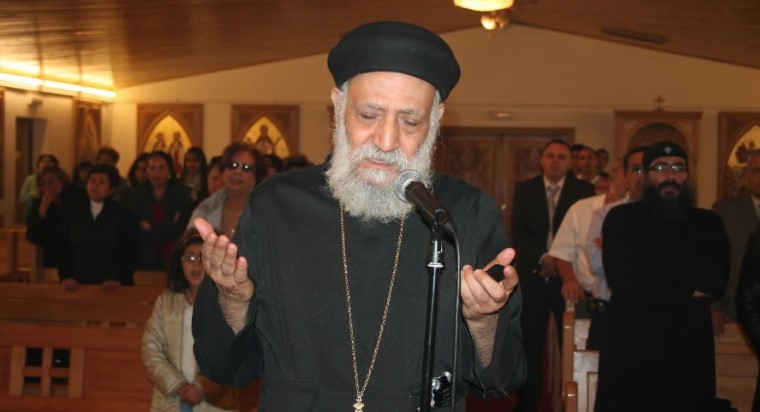Every New Year we title it with a new name. We cherish it throughout the year to support our spiritual growth. Towards the end of the last year, more than 25 people, who were mostly ladies and girls, were martyred in St. Peter and St. Paul Church in Abbassya, Egypt. A mutual prayer meeting was …
Every New Year we title it with a new name. We cherish it throughout the year to support our spiritual growth. Towards the end of the last year, more than 25 people, who were mostly ladies and girls, were martyred in St. Peter and St. Paul Church in Abbassya, Egypt. A mutual prayer meeting was held in St. Mary’s Church in East Brunswick, New Jersey. The atmosphere there was filled with the full providence of God. When I went out, a lot of people asked me, “Please pray for me so I can have a share with those martyrs.” The mother of Maggie, a young girl martyr was asked, “What do you feel?” The mother replied with hope in her spirit, “I raised my daughters to go to heaven!” This was the reason that I will name the coming year, the Year of the Welcoming Heaven.
My heart and mind are always busy thinking that I am in a joyful journey toward heaven. The doors of heaven are open for me and I am longing for my Savior who welcomes me so I can enjoy all His heavenly blessings. A lot of people were blessed with the open heavenly vision, both before and after the Law of Moses, or during Jesus’ life on earth or after His ascension, throughout the ages. The Holy Bible recorded a few to teach us. The others who were not recorded enjoyed secretly with a divine plan. Here are some examples in the bible throughout the history to shed light for us to enjoy Heaven.
1. Adam in the Garden of Eden
God gave Adam uncountable blessings when He created him. One of the blessings given to Adam as it says in the bible is that he heard, “the voice of the Lord, God walking in the Paradise,” (Genesis 3:8). Adam and Eve used to meet with the voice of the Lord in the Paradise of Eden. Moses the prophet did not comment on their situation of this vision. No language helped record their feelings and what their feelings were when they focused their eyes and hearts on God. Surely, they wanted Him to accept their thanksgiving sacrifices for His unlimited love to them, which they are not able to requite. When they met with Him, they enjoyed the welcoming heaven. The sad thing is in this same place, they committed sin against God. They were not able to tolerate hearing the voice of God. God called, “Adam, Adam, where are you?” (Genesis 3:9). They trembled and ran away to the fig trees, and tried to sew clothes to cover themselves after they lost their divine garment of righteousness. That is how the Paradise of Eden turned into a shameful and a terrifying place for them. This happens to us too when we blame our environment for preventing us from viewing the open heaven. We are supposed to blame our laziness in asking to see God.
Moses with all that he had of divine blessings, the only thing he was concerned with amongst his many obligations was to see God, “Show me your glory,” (Exodus 33:18).
St. Augustine asks us not to lift our heads towards heaven when praying the heavenly prayer but to focus our sights into our depth because heaven is inside us. The Lord said to the disciples, “the Kingdom of God is within you,” (Luke 17:21).
Adam was in Paradise when he escaped from God’s face, hiding among the trees, but when Jonah was in the whale’s belly he saw the heaven. For that he sang, “when my soul fainted within me, I remembered the Lord; and my prayer went up to You, Into Your holy temple” (Jonah 2:7).
What we learned from our forefathers is that when we ignore the divine Law, it prevents us from seeing the welcoming heaven or even having a joyful conversation with our beloved God, the Lover of Mankind. We see in Moses, the leader of God’s people, despite all his obligations and his age, all he thought about was to ask from God, “Open my eyes to see your heavenly glory.” Jonah who was in the whale’s belly in the deep sea did not stop praying to his Lord. This opened his vision to heaven that he didn’t experience before when he lived in Jerusalem.
2. The Vision of Jacob’s Ladder
Adam and Eve could not tolerate meeting with God. Jacob the son of Isaac is considered a man of God who did not live in the Paradise of Eden as his forefathers did. He lived with his only brother, that wanted to kill him, and his mother, who was very disappointed and suggested to deceive his father to receive the blessings instead of his older brother. His old father gave him the blessings, asked him to go to his uncle’s house so he can find a wife from their family. Jacob did not ride a horse, camel, or donkey, but he held his staff and crossed the Jordan River. He was focusing on the God of his father Isaac, and his grandfather Abraham. During the night, on the road by himself, having nothing but his staff, he said, “with my staff I crossed the Jordan river,” (Genesis 38:18). Jacob laid down on the ground, he put his head on a stone anointed with oil, and closed his eyes, but his vision was opened. He saw a ladder coming down from heaven reaching his head and angels were going up and down and God was standing at the heaven’s gate, which was opened, welcoming him. It is an amazing act of God towards him and all his troubles and loneliness in a very dangerous journey to his uncle. Jacob experienced fear mixed with joy. He said, “How awesome is this place! This is none other than the house of God, and this is the gate of heaven!”
Fr. Ceasarius, Bishop of Arles[1] presented the vision of Jacob’s ladder as a great example for the weak who are surrounded by troubles to become icons of Christ, and for those people to experience the open and welcoming heaven and the descending of God and incarnation with His ascension carries us to heaven. He directed us to the following:
-
Although Jacob’s weakness and deception to his father, he was given to see the open heaven because of his pure heart and humility. God welcomed him as did the angels. He saw the ladder coming down from heaven and the angels going up to offer his purity of heart and coming down from heaven to his head to offer divine blessings. God allowed Jacob’s sons to deceive him so he can know how bitter the deceit was to his father Isaac.
-
Jacob became an example for God the Lord, the Savior of humanity and a beautiful icon for Him. Our goal is two things. First, to meet with Jesus our groom, and second is to become a living icon for Him.
-
Jacob was proud to cross the Jordan by his staff and we have to be proud with the cross of Jesus Christ as our staff. With our cross we can get through everyday to heaven with our conversation with the Lord.
-
Jacob’s father’s will was to let him go to his uncle’s house who lived in a different society and choose a wife there. That is what our Lord Jesus did with his disciples to the Gentiles. They taught for the sake of the Church of the Gentiles as a bride to Christ the Groom. Our part is to pray and act through God’s spirit for the sake of the lost and those who are astray, and welcome them to experience with us the open heaven like a joyful bride to her heavenly Groom.
Please God, give me the will to keep your laws so I can enjoy and experience your open heaven.
May I be crucified with You so I can cross not just the Jordan River with Jacob but to go straight to Your heaven.
Also, give me the ability to listen to Your Holy will so that all of humanity can believe in You and they will become an icon of You and enjoy the heavenly wedding.
Fr. Tadros Y. Malaty
Translated by: Hala Ghabriel
[1] Cf. Ceassarius of Arles: Sermon 87 “On Jacob’s Ladder.”
Join Us: Sign Up Today!
Tags:











